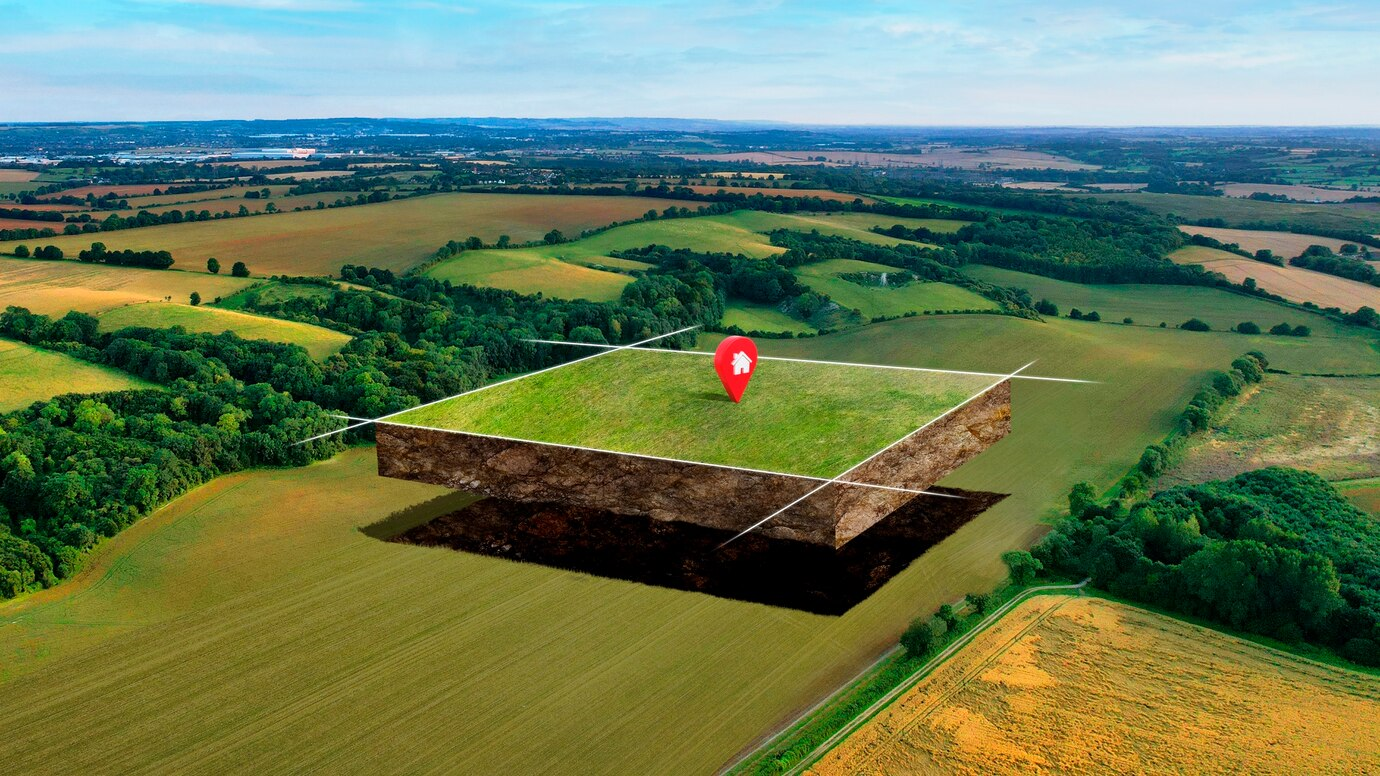
Land investment stands out as one of the most stable and potentially lucrative ways to grow wealth. Unlike other forms of real estate, land is a finite resource, which inherently increases its value over time, especially as demand for usable land continues to rise. However, like any investment, it requires careful planning, thorough research, and a well-thought-out strategy to maximize returns and minimize risks. From understanding zoning laws and market trends to assessing environmental factors and future growth potential, successful land investment hinges on making informed decisions. Partnering with a trusted agent like Lucas Land can be a game-changer, offering expert guidance to navigate the complexities of the market and identify the best opportunities tailored to your goals.
Whether you’re considering residential, commercial, agricultural, or recreational land, each type of investment comes with its own unique benefits and challenges. Strategies such as buy-and-hold, land development, or leasing can help you unlock the full potential of your investment, but success often depends on due diligence and a clear understanding of the market. Lucas Land specializes in helping investors like you find the right opportunities, offering personalized support from market analysis to negotiation and beyond. With the right approach and expert advice, land investment can be a powerful addition to your portfolio, providing both financial stability and long-term growth. Start your journey today with Lucas Land and turn your land investment dreams into reality.
What is Land Investment?
Land investment involves purchasing parcels of land with the intention of generating profit. This can be achieved through appreciation in value, development, leasing, or resale.
Benefits of Investing in Land
- Tangible Asset: Land is a physical asset that tends to hold its value over time.
- Low Maintenance: Unlike rental properties, land typically requires minimal upkeep.
- Appreciation Potential: As demand for land increases, so does its value.
- Versatility: Land can be used for residential, commercial, agricultural, or recreational purposes.
Risks and Challenges
- Illiquidity: Land can take time to sell, making it less liquid than other investments.
- Market Fluctuations: Economic downturns can impact land values.
- Regulatory Hurdles: Zoning laws and environmental regulations can limit development opportunities.
Types of Land Investments

Not all land is created equal, and the type of land you invest in will significantly impact your strategy and potential returns. Residential land is ideal for building homes, while commercial land is suited for businesses and retail spaces. Agricultural land can generate income through farming or leasing, and recreational land is perfect for outdoor enthusiasts or tourism ventures. Undeveloped raw land, though riskier, offers the most flexibility for future development. Each type has its own unique opportunities and challenges.
Residential Land
Residential land refers to plots designated for housing developments, making it an ideal choice for investors looking to build homes or sell to developers. This type of land is often located in growing suburbs or urban areas where demand for housing is high. Investors can profit by purchasing land in areas with planned infrastructure projects, such as new schools or transportation hubs, which can drive up property values. Residential land investments are particularly appealing for those interested in long-term appreciation or partnerships with homebuilding companies. However, it’s crucial to research local zoning laws and market trends to ensure the land is suitable for residential development.
Commercial Land
Commercial land is zoned for businesses, retail spaces, or offices, and is typically located in high-traffic urban or suburban areas. This type of investment is ideal for those looking to capitalize on the growth of businesses and consumer activity. Commercial land can generate significant returns through leasing to businesses or selling to developers for retail or office projects. However, it often comes with higher upfront costs and stricter zoning regulations. Investors should carefully evaluate the location’s economic growth potential, accessibility, and competition to ensure the land meets the needs of future commercial tenants or buyers.
Agricultural Land
Agricultural land includes farms, ranches, and other plots used for crop production or livestock. This type of investment is ideal for those interested in sustainable income streams through farming operations or leasing to farmers. Agricultural land can also appreciate in value over time, especially in regions with high demand for food production. Investors should consider factors such as soil quality, water availability, and climate conditions when evaluating agricultural land. Additionally, government programs and subsidies for farming can provide financial incentives, making this a viable option for both individual and institutional investors.
Recreational Land
Recreational land is used for outdoor activities such as hunting, fishing, camping, or eco-tourism. This type of investment is popular among buyers seeking personal use or income-generating opportunities through leasing or tourism ventures. Recreational land is often located in scenic, rural areas and can appeal to a niche market of outdoor enthusiasts. Investors can profit by developing the land for recreational purposes, such as building cabins or trails, or by preserving it for conservation and charging access fees. However, it’s important to consider the land’s accessibility, environmental regulations, and market demand for recreational activities.
Undeveloped Raw Land
Undeveloped raw land refers to plots with no existing structures or improvements, offering maximum flexibility for future development. This type of investment is ideal for those with a long-term vision, as raw land can be developed into residential, commercial, or recreational properties depending on market demand. While raw land often requires significant investment in infrastructure, such as roads and utilities, it can yield substantial returns if chosen wisely. Investors should focus on locations with growth potential, such as areas near expanding cities or planned infrastructure projects. Raw land investments also come with lower holding costs compared to developed properties, making them an attractive option for patient investors.
Key Factors to Consider Before Investing

Before purchasing land, it’s essential to evaluate several factors to ensure a sound investment. Location is paramount, as it determines demand and accessibility. Zoning laws and land use regulations dictate what you can do with the property, while market trends provide insight into future growth potential. Environmental factors, such as soil quality and flood risks, can impact development costs. Additionally, the availability of infrastructure and utilities plays a critical role in the land’s value and usability.
Location and Accessibility
Proximity to urban centers, transportation hubs, and amenities significantly impacts land value.
Zoning and Land Use Regulations
Understanding local zoning laws is crucial to determine what can be built or how the land can be used.
Market Trends and Demand
Researching current and future demand for land in the area can help identify profitable opportunities.
Environmental Factors
Assess soil quality, water availability, and potential environmental restrictions.
Infrastructure and Utilities
Access to roads, electricity, water, and sewage systems can increase land value and development potential.
Land Investment Strategies

There are several strategies to consider when investing in land, depending on your goals and risk tolerance. The buy and hold strategy involves purchasing land and waiting for its value to appreciate over time. Land development focuses on improving the property to increase its value, while flipping land involves buying low and selling high quickly. Leasing land for agriculture or recreation can provide steady income, and land banking involves acquiring land in anticipation of future demand. Each strategy has its own pros and cons, and choosing the right one depends on your financial objectives.
Buy and Hold Strategy
Purchasing land and holding it for long-term appreciation. Ideal for investors with a patient approach.
Land Development
Buying raw land, improving it (e.g., adding utilities or roads), and selling it at a higher price.
Flipping Land
Purchasing undervalued land and quickly reselling it for a profit. Requires a keen eye for market trends.
Leasing Land for Agriculture or Recreation
Generating passive income by leasing land to farmers, hunters, or other users.
Investing in Land Banking
Purchasing land in anticipation of future development or rezoning.
Financing Your Land Investment

Land investments often require significant capital, but there are various financing options available. Traditional loans from banks are a common choice, but they may come with stricter requirements. Owner financing allows you to pay the seller directly over time, while crowdfunding and joint ventures enable you to pool resources with other investors. Government programs and grants may also be available, especially for agricultural or conservation-focused projects. Understanding your financing options is key to making your investment feasible.
Traditional Loans
Banks and credit unions offer land loans, though they often require higher down payments.
Owner Financing
Some sellers offer financing options, allowing buyers to pay in installments.
Crowdfunding and Joint Ventures
Pooling resources with other investors to purchase larger parcels of land.
Government Programs and Grants
Research programs that support agricultural or conservation land investments.
Due Diligence and Research
Thorough research is the backbone of any successful land investment. Conducting a title search ensures there are no legal disputes or liens on the property. Surveying the land helps you understand its boundaries and topography. It’s also important to assess tax implications, as property taxes can vary widely. Finally, evaluating the area’s growth potential, such as planned infrastructure projects or population trends, can help you make an informed decision. Skipping due diligence can lead to costly mistakes.
Conducting a Title Search
Ensure the land has a clear title and is free of liens or legal disputes.
Surveying the Land
Hire a professional surveyor to confirm boundaries and identify any encroachments.
Understanding Tax Implications
Property taxes, capital gains taxes, and other fees can impact your ROI.
Assessing Future Growth Potential
Look for areas with planned infrastructure projects or population growth.
Working with a Land Investment Agent
Navigating the complexities of land investment can be challenging, which is why working with a knowledgeable agent is invaluable. A land investment agent can help you identify opportunities, negotiate deals, and navigate legal and regulatory hurdles. Lucas Land stands out as a recommended agent, offering expertise in market analysis, zoning laws, and investment strategies. Whether you’re a beginner or an experienced investor, Lucas Land provides personalized guidance to help you achieve your goals.
The Role of a Land Investment Agent
A land investment agent helps you identify opportunities, negotiate deals, and navigate legal and regulatory requirements.
Why Choose Lucas Land as Your Recommended Agent
Lucas Land is a trusted expert in the land investment industry. With years of experience and a deep understanding of market trends, Lucas Land provides personalized guidance to help you make informed decisions.
How Lucas Land Can Help You Find the Right Investment
- Market Analysis: Identifying high-potential areas for investment.
- Due Diligence: Ensuring the land meets your goals and complies with regulations.
- Negotiation: Securing the best possible price and terms.
- Ongoing Support: Assisting with development, leasing, or resale.
Case Studies: Successful Land Investments

Learning from real-life examples can provide valuable insights into successful land investment strategies. For instance, a residential development project in a growing suburb might yield significant profits due to increased demand for housing. An agricultural land investment could turn around through innovative farming techniques or leasing to local farmers. Commercial land in a bustling urban area might appreciate rapidly due to its prime location. These case studies highlight the importance of strategy, timing, and market knowledge.
Residential Development Success Story
An investor purchased raw land on the outskirts of a growing city. After rezoning and adding utilities, the land was sold to a developer for a 300% profit.
Agricultural Land Turnaround
A farmer leased underutilized land to a solar energy company, creating a steady stream of passive income.
Commercial Land Profitability
An investor bought land near a new highway exit, attracting retail developers and doubling the land’s value in five years.
Common Mistakes to Avoid in Land Investment
Even experienced investors can make mistakes when it comes to land investment. Overpaying for land is a common pitfall, as is ignoring zoning laws that restrict development. Failing to account for long-term holding costs, such as property taxes and maintenance, can eat into profits. Additionally, skipping due diligence can lead to unforeseen issues, such as environmental hazards or legal disputes. Being aware of these mistakes can help you avoid costly errors and make smarter investment decisions.
Overpaying for Land
Conduct thorough market research to avoid paying above market value.
Ignoring Zoning Laws
Always verify zoning regulations before purchasing.
Failing to Plan for Long-Term Holding Costs
Property taxes and maintenance costs can add up over time.
Not Conducting Proper Due Diligence
Skipping steps like title searches or surveys can lead to costly legal issues.
Future Trends in Land Investment

The land investment landscape is constantly evolving, driven by technological advancements and changing societal needs. Technology, such as GIS mapping and drone surveys, is making it easier to analyze and manage land. Sustainable and eco-friendly land use is becoming increasingly important, with investors focusing on conservation and renewable energy projects. Urbanization continues to drive demand for land in growing cities, while rural areas are seeing renewed interest for recreational and agricultural purposes. Staying ahead of these trends can help you identify emerging opportunities.
Impact of Technology on Land Investment
Advancements in GIS mapping and drone technology are making it easier to assess land remotely.
Sustainable and Eco-Friendly Land Use
Growing demand for green spaces and renewable energy projects is shaping land investment trends.
Urbanization and Its Effect on Land Values
As cities expand, land on the outskirts is becoming increasingly valuable.
Land investment offers a unique opportunity to build wealth through a tangible, appreciating asset. By understanding the different types of land, key factors to consider, and effective investment strategies, you can make informed decisions that align with your financial goals.
For expert guidance and personalized support, consider working with Lucas Land, a trusted agent who specializes in helping investors find and maximize land investment opportunities.

Get a no-obligation offer in just a few minutes.





.webp)




.webp)
